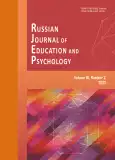Approaches to designing the educational experience of students in higher education
- Authors: Bogatyrev K.A.1
-
Affiliations:
- Moscow Psychological and Social University
- Issue: Vol 16, No 2 (2025)
- Pages: 397-414
- Section: Psychological Studies
- Published: 30.04.2025
- URL: https://bakhtiniada.ru/2658-4034/article/view/302886
- DOI: https://doi.org/10.12731/2658-4034-2025-16-2-727
- EDN: https://elibrary.ru/JLDQTH
- ID: 302886
Cite item
Full Text
Abstract
Background. Designing the experience of learners in the digital environment is an integral component of the development and implementation of modern higher education programs. At the same time, the genesis of the term remains poorly understood, which creates barriers to process management.
Purpose is to analyze existing approaches to the definition, systematize the available data and propose an empirical model for designing educational experience. Hypothesis: when implementing online learning in higher education, it is necessary to pay attention not only to organizational aspects and methodology, but also to various psychological characteristics of the group.
Materials and methods. The sample consisted of 86 teachers and 1185 students from leading Russian universities. To evaluate the results, the methodology of L. B. Schneider and the author's questionnaires were used.
Results. Designing educational experience is an activity aimed at creating and implementing projects in the field of education, which is aimed at acquiring knowledge, skills and abilities by students, which in turn shape the personality and transform thinking. The key stages of design and the main psychological characteristics that must be taken into account when developing educational programs are identified. The study may be useful in the context of the development of digital education in Russian universities.
About the authors
Kirill A. Bogatyrev
Moscow Psychological and Social University
Author for correspondence.
Email: kirill.bogatirev2011@yandex.ru
ORCID iD: 0000-0003-1573-7964
Graduate Student
Russian Federation, 9a, 4th Roshchinsky proezd, Moscow, 115191, Russian FederationReferences
- Bashkirova, L. I. (2020). Development of ideas of designing as a way of innovative changes in educational organizations. Scientific Papers of Moscow Humanitarian University, (4), 28–34. https://doi.org/10.17805/trudy.2020.4.4 EDN: https://elibrary.ru/JYWQPT
- Bogatyrev, K. A. (2024). Psychological characteristics of applicants choosing distance learning programs in Russian higher education institutions. Topical Issues of Psychological Knowledge, (1(66)), 230–244. https://doi.org/10.51944/20738544_2024_1_230 EDN: https://elibrary.ru/PBRXVC
- Bogatyrev, K. A. (2024). Educational experience of learners as a subject of psychological research. World of Science. Pedagogy and Psychology, 12(5).
- Bogatyrev, K. A. (2024). The role of student feedback in implementing educational disciplines. In Life Trajectories of Personality in the Modern World: Social and Individual Context: Collection of articles of the II International Scientific and Practical Conference (pp. 203–207). Kostroma: Kostroma State University.
- Vezetiu, E. V. (2019). Designing, pedagogical design, design of educational process: justification of the essence of concepts. Problems of Modern Pedagogical Education, (65–1), 53–55.
- Gorkun, M. I. (2018). Development of professional experience as the basis for constructing a modern educational process. Man and Education, (4(57)), 159–164.
- Gritsova, O. A., & Tissen, E. V. (2021). Evaluation of online learning quality in the higher education system in regions. Regional Economy, 17(3), 929–943. https://doi.org/10.17059/ekon.reg.2021-3-15
- Eliseeva, E. N. (2018). Evaluation of consumer satisfaction and loyalty in higher education. Society, Economy, Management, 3(4), 62–67.
- Isakov, I. Z., & Suslova, I. P. (2024). Evaluation of market dominance in online education in the Russian Federation. Scientific Papers: Institute of National Economic Forecasting of the Russian Academy of Sciences, 22(3), 72–87. https://doi.org/10.47711/2076-3182-2024-3-72-87 EDN: https://elibrary.ru/CZBQLF
- Kovalchuk, V. K. (2023). The role of higher education in shaping the personality of students: current realities. Society and State, (3(43)), 14–18. https://doi.org/10.24412/2224-9125-2023-3-14-18 EDN: https://elibrary.ru/LPPITN
- Korneenko, T. N., & Shcheglova, I. A. (2021). Evaluation of student educational experience as a tool for making managerial decisions in a university. University Management: Practice and Analysis, 25(3), 82–99. https://doi.org/10.15826/umpa.2021.03.029 EDN: https://elibrary.ru/GMCPAM
- Makarenko, Yu. V., Sitseva, A. S., & Braslavskaya, Ye. A. (2024). Features of communicative competence of future specialists of socionic profile. Russian Journal of Education and Psychology, 15(2), 42–61. https://doi.org/10.12731/2658-4034-2024-15-2-495 EDN: https://elibrary.ru/RWEXBN
- Misakov, N. A. (2024). Use of online programs for remote learning in higher education institutions: problems and potential. In Digital Future: Social and Economic Problems, Challenges and Opportunities: Collection of Articles of Round Table (pp. 258–262). Moscow: KD.
- Neumann, V. L. (2023). Current trends in distance education. Society: Sociology, Psychology, Pedagogy, (4(108)), 156–161. https://doi.org/10.24158/spp.2023.4.24
- Vil'kova, A. V., & Fadeeva, S. A. (2020). From personalized adult education to personalized children's education. Scientific and Pedagogical Review, (6(34)), 23–30. https://doi.org/10.23951/2307-6127-2020-6-23-30 EDN: https://elibrary.ru/KGDDMJ
- Pitkevich, M. Yu. (2013). Methods of assessing and increasing stress tolerance levels. Bulletin of Peoples' Friendship University of Russia. Series: Ecology and Life Safety, (S5), 47–52.
- Purysheva, N. S., & Gurina, R. V. (2006). Structure of educational concept in pedagogical research. Education and Science. Newsletter of the Ural Branch of the Russian Academy of Education, (4(40)), 12–20.
- Romanov, E. V., & Drozdova, T. V. (2017). Distance learning: necessary and sufficient conditions for effective implementation. Modern Education, (1), 172–195.
- Stratievskaia, E. S. (2024). Educational process. Designing educational experience. Trends in the Development of Science and Education, (105-5), 137–140. https://doi.org/10.18411/trnio-01-2024-243 EDN: https://elibrary.ru/VREIWI
- Sun, Ya. (2023). Designing bachelor's and master's educational programs under interaction with Russian and Chinese universities. In Collection of Materials of the International Scientific and Practical Conference devoted to the 90th Anniversary of Higher Pedagogical Education in Arkhangelsk (pp. 102–107). Arkhangelsk: LLC "Consulting Information Advertising Agency".
- Choguldurov, M. D. (2023). Current trends in managing the quality of distance education in higher education institutions. News of the Kyrgyz Academy of Education, (3(61)), 94–102.
- Shneider, L. B., & Bogatyrev, K. A. (2023). Cycle of educational changes: realities, challenges and risks. In Modern Reality in a Socio-Psychological Context - 2023: Materials of the VII All-Russian Scientific and Practical Conference with International Participation (pp. 142–151). Novosibirsk: Novosibirsk State Pedagogical University.
- Shneider, L. B. (2022). Multiaspectness of pedagogical work and reflection of educational practices. In Psychology and Life: Topical Issues of Psychology of Education and Personality Development in the Modern World: Materials of the VI International Scientific and Practical Conference (pp. 48–55). Minsk: Belarusian State Pedagogical University named after M. Tank.
Supplementary files










